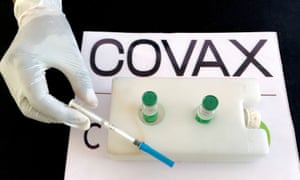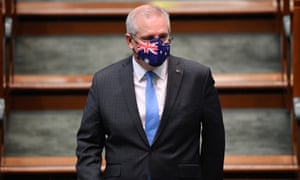
3.20am EDT03:20
Britain’s GlaxoSmithKline (GSK) and South Korean pharmaceutical firm SK Bioscience have begun a phase three trial of their combined Covid vaccine.
GSK confirmed “positive” interim results from its first two rounds of studies and said the partners are aiming for the product to be available through Covax in the first half of 2022, reports PA Media.
The rollout of the new coronavirus vaccine will be subject to data and regulatory reviews.
Thomas Breuer, chief global health officer, GSK, said:
While many countries have made good progress with vaccination, there remains a need for accessible and affordable Covid-19 vaccines to ensure equitable access and to protect people across the world.
We are pleased to contribute with GSK’s pandemic adjuvant and to be working with SK to deliver the vaccine at scale via Covax if it is approved.
Around 4,000 participants from various countries will be monitored to evaluate the vaccine candidate’s safety and immunogenicity compared with the AstraZeneca vaccine.

The vaccine will be available through the Covax facility. Photograph: Tiksa Negeri/Reuters
GSK said the study will be one of the first global late-stage trials to compare two different vaccine candidates.
SK Bioscience chief executive Jaeyong Ahn added:
We are grateful that we were able to advance to the phase three study with the unprecedented support of global initiatives, including GSK, Coalition for Epidemic Preparedness Initiative, and the Bill & Melinda Gates Foundation.
Taking this important step towards overcoming the global pandemic situation, SK and GSK will bring our technical expertise together for the development of an adjuvanted protein-based vaccine candidate, GBP510.
2.40am EDT02:40
Australia will ramp up its vaccination programme this week after prime minister Scott Morrison announced it is set to receive 500,000 doses of the Pfizer jab in a swap deal with Singapore.
Canberra struck the deal, which will see Australia return the same amount of vaccine doses to Singapore in December, as daily cases reached near record levels for the country, the Reuters news agency reported.
Morrison told reporters today:
That means there are 500,000 doses extra that will happen in September that otherwise would have had to wait for several months from now, accelerating our vaccination program at this critical time as we walk towards those 70% and 80% target.

Scott Morrison confirmed the swap deal on Tuesday. Photograph: Mick Tsikas/AAP
A slow rollout of the vaccine has left Australia particularly vulnerable to the highly transmissible Delta coronavirus variant, despite initial success in containing the virus by implementing a strict lockdown and quarantine system.
With just under 28% of Australia’s population fully vaccinated, compared with 80% in Singapore, several states and territories have had to reintroduce strict lockdowns as cases soared, hitting businesses and the domestic economy.
Updated
at 3.04am EDT
2.05am EDT02:05
Summary
That’s it from me, Helen Livingstone, for today. I’m handing over to my UK colleague Tom Ambrose.
Before I go, here’s a quick roundup of what’s been happening over the past 24 hours:
- New cases of Covid-19 have continued to drop in New Zealand, in a promising early indication that the country’s strict lockdown is working and its latest outbreak may be coming under control. The country reported 49 new cases on Tuesday, down from 53 a day earlier.
- Australia’s capital, Canberra, has extended its hard lockdown by a further two weeks as it struggles to contain a surge in the highly infectious Delta variant. New South Wales, meanwhile, reported 1,164 new infections, down slightly from a record 1,290 cases the day prior.
- Japan’s health minister says it is highly likely that foreign matter found in Moderna Inc Covid-19 vaccines in the southern prefecture of Okinawa came about when needles where stuck incorrectly into vials.
- The EU has removed six countries, including the US, from a Covid “white list” of places whose tourists should be permitted entry without restrictions such as mandatory quarantine.
- The number of solid organ transplants fell dramatically around the world between 2019 and 2020, a study published in the Lancet Public Health journal has found, highlighting the widespread impact of the Covid-19 pandemic on health services and patients.
- South African scientists have detected a new coronavirus variant that may have increased transmissibility. Scientists are yet to establish whether it is more contagious or able to overcome the immunity provided by vaccines or prior infection.
- Schools across Europe must stay open and be made safer for staff and children, the WHO and Unicef have demanded, as a new term gets under way with the highly transmissible Delta variant still dominant in the region.
- A third-dose booster shot of the Covid-19 vaccine is a way to keep the most vulnerable safe and “not a luxury”, the WHO has said. It urged European countries with excess vaccines to share them with other countries, particularly those in eastern Europe and Africa.
- Senior WHO officials fear there could be 236,000 more Covid deaths in Europe between now and 1 December on account of stagnating vaccination rates and low uptake in poorer countries.
- The UK has reported 26,476 new cases of Covid-19 between 24 August and 30 August, bringing reported cases up by 1.8% compared with the previous seven days.
- Two counties in the US state of Oregon, hit hard by Covid-19, are running out of space to hold bodies amid an intense surge in cases that is overwhelming the state’s healthcare system, forcing authorities to request refrigerated trucks to help handle the overflow.
- The Czech government will offer a booster Covid-19 vaccine to any previously vaccinated person. The jabs will be available from 20 September.
- France will provide 10m doses of AstraZeneca and Pfizer vaccines for Africa over the next three months, President Emmanuel Macron’s office has announced.
- The Scottish first minister, Nicola Sturgeon, tested negative for Covid-19 after being identified as a close contact of a person with the virus. Sturgeon was self-isolating pending a PCR test result but she was no longer doing so in accordance with current regulations.
Updated
at 3.04am EDT
1.40am EDT01:40
Racing off for a Covid test at any opportunity, rushing to donate blood or ambling to three different takeout venues on a Saturday night? Australian parents are apparently getting creative in their bid to find alone time during lockdown. The Guardian’s Alexandra Carlton reports:
1.26am EDT01:26

Melissa Davey
A new Covid variant has made headlines around the world after the National Institute for Communicable Diseases in South Africa issued an alert about the “C.1.2 lineage”, saying it had been detected in all provinces in the country, but at a relatively low rate.
C.1.2 was first detected in May, the alert said, but Delta is still the dominant variant spreading in South Africa and the world.
A pre-print, non peer-reviewed paper published about the variant said C.1.2 “… has since been detected across the majority of the provinces in South Africa and in seven other countries spanning Africa, Europe, Asia and Oceania”.
The C.1.2 lineage has drawn the attention of scientists because despite its low rate in the population, it possesses mutations within the genome similar to those seen in variants of interest and variants of concern, like the Delta variant, as well as some additional mutations.
So what do we know about the new variant, and how concerned should we be?
1.16am EDT01:16
Japan’s health minister says it is highly likely that foreign matter found in Moderna Inc Covid-19 vaccines in the southern prefecture of Okinawa got into vials when needles were stuck in, Reuters reports.
Some Moderna shots were temporarily halted in Okinawa on Sunday after foreign materials were discovered in vials and syringes. The health ministry said later needles may have been incorrectly inserted into vials, breaking off bits of the rubber stopper.
“Whatever the reason (for the foreign matter) we have heard that there is no safety or other issues,” health minister Norihisa Tamura told reporters on Tuesday, adding that it was not uncommon for foreign material to enter a vial with other vaccines.
“We will continue to gather information and report back,” he added.

Elderly people wait to receive their Covid-19 vaccines in Naha, Okinawa, Japan. Photograph: Keizo Mori/UPI/REX/Shutterstock
Japan is facing its biggest wave of Covid-19 infections so far during the pandemic, driven by the highly transmissible Delta variant.
A race to boost inoculations has been hampered by delays in imported vaccines and the discovery of the contaminants in some Moderna doses that prompted the suspension of three batches last week.
Taro Kono, the minister in charge of the inoculation campaign, said on Tuesday he wanted to speed up shipments of vaccines to municipalities that had been forced to put a halt reservations due to shortages.
The government is considering when and how to give out booster shots that may be needed to maintain immunity against the virus but is focusing for now on completing the first two shots for the public, Kono told reporters.
1.07am EDT01:07
Welcome
Hello and welcome to the Guardian’s rolling coverage of the coronavirus pandemic with me, Helen Livingstone.
New cases of Covid-19 have continued to drop in New Zealand, in a promising early indication that the country’s strict lockdown is working and its latest outbreak may be coming under control. The country reported 49 new cases on Tuesday, down from 53 a day earlier.
In other developments:
- Japan’s health minister says it is highly likely that foreign matter found in Moderna Inc Covid-19 vaccines in the southern prefecture of Okinawa came about when needles where stuck incorrectly into vials.
- The number of solid organ transplants fell dramatically around the world between 2019 and 2020, a study published in the Lancet Public Health journal has found, highlighting the widespread impact of the Covid-19 pandemic on health services and patients.
- South African scientists have detected a new coronavirus variant that may have increased transmissibility. Scientists are yet to establish whether it is more contagious or able to overcome the immunity provided by vaccines or prior infection.
- Schools across Europe must stay open and be made safer for staff and children, the WHO and Unicef have demanded, as a new term gets under way with the highly transmissible Delta variant still dominant in the region.
- A third-dose booster shot of the Covid-19 vaccine is a way to keep the most vulnerable safe and “not a luxury”, the WHO has said. It urged European countries with excess vaccines to share them with other countries, particularly those in eastern Europe and Africa.
- Senior WHO officials fear there could be 236,000 more Covid deaths in Europe between now and 1 December on account of stagnating vaccination rates and low uptake in poorer countries.
- The UK has reported 26,476 new cases of Covid-19 between 24 August and 30 August, bringing reported cases up by 1.8% compared with the previous seven days.
- Two counties in the US state of Oregon, hit hard by Covid-19, are running out of space to hold bodies amid an intense surge in cases that is overwhelming the state’s healthcare system, forcing authorities to request refrigerated trucks to help handle the overflow.
- The Czech government will offer a booster Covid-19 vaccine to any previously vaccinated person. The jabs will be available from 20 September.
- France will provide 10m doses of AstraZeneca and Pfizer vaccines for Africa over the next three months, President Emmanuel Macron’s office has announced.
- Scottish first minister, Nicola Sturgeon, tested negative for Covid-19 after being identified as a close contact of a person with the virus. Sturgeon was self-isolating pending a PCR test result but she was no longer doing so in accordance with current regulations.


